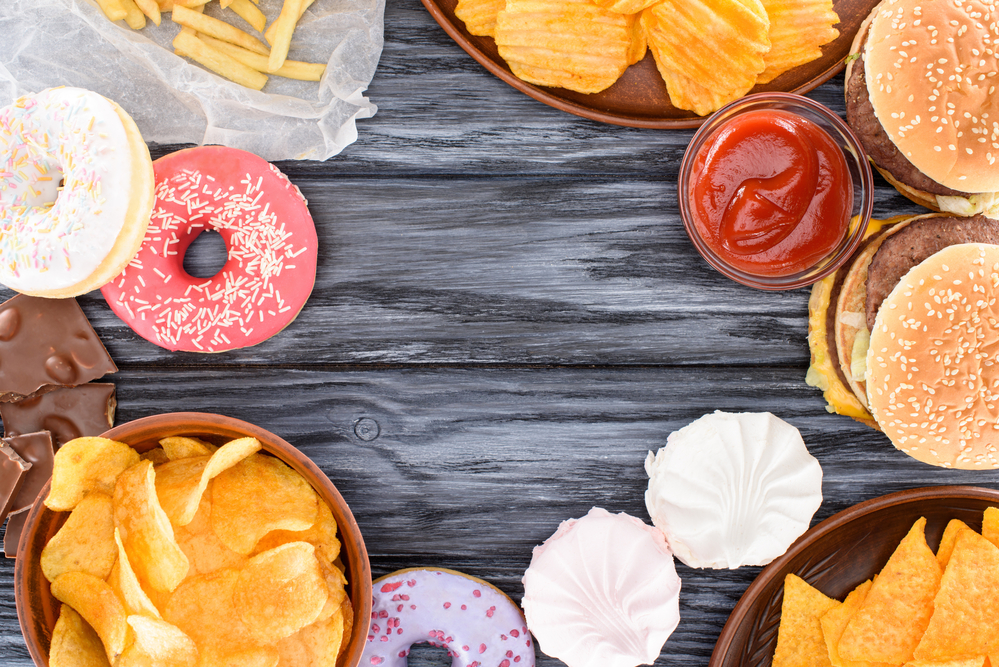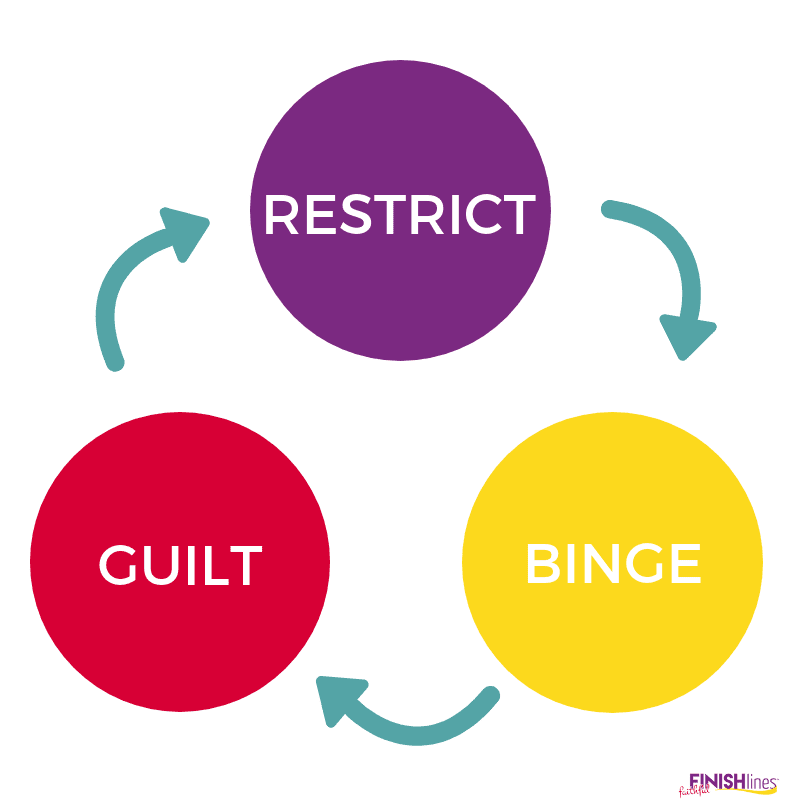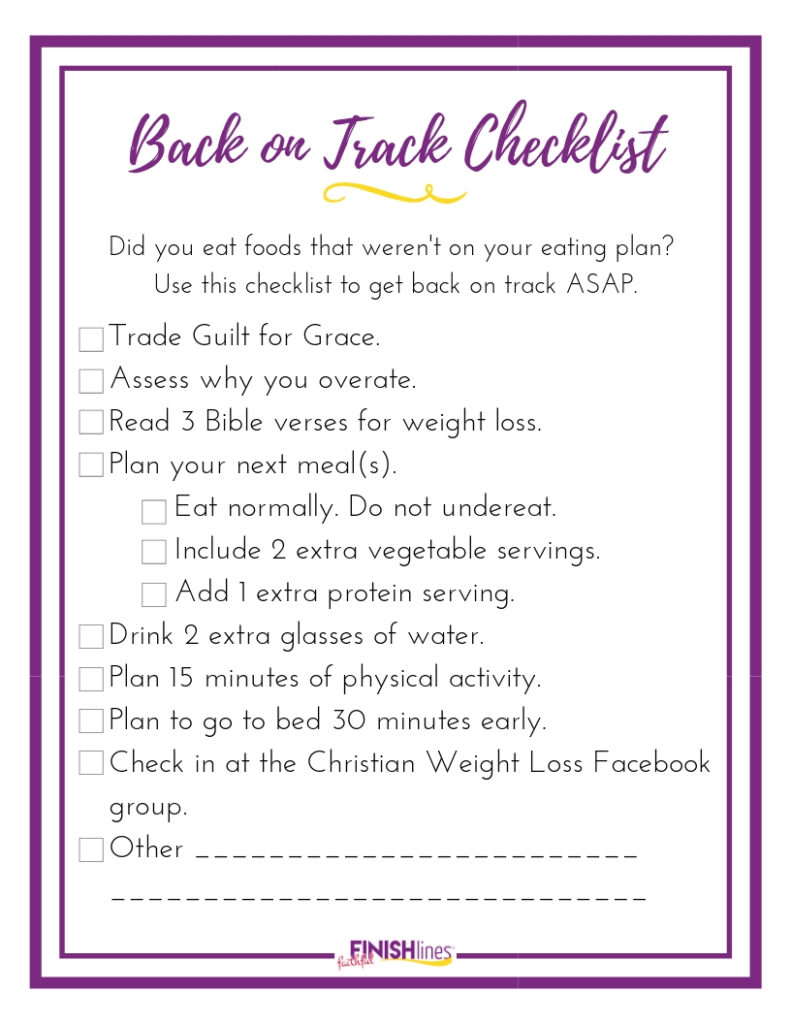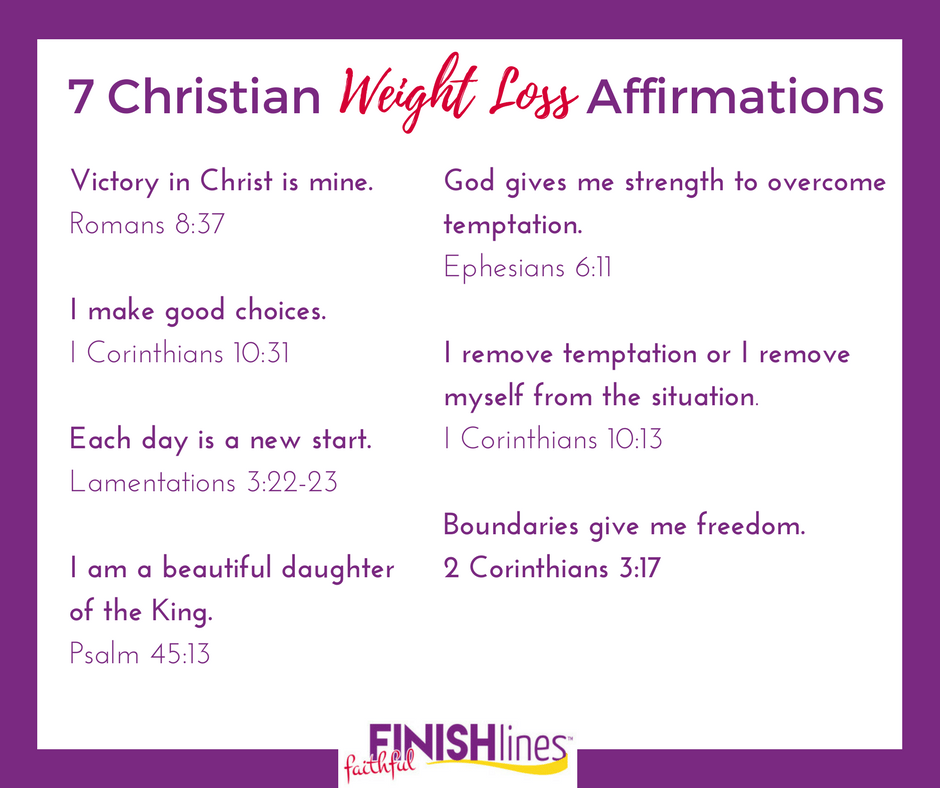You’ve overeaten. Binged. Now you’re feeling bloated, miserable, and defeated. All is not lost! Here’s a step by step guide for how to get back on track after binge eating. (We’ve even included a free PDF printable Back on Track checklist.)

- What is Binge Eating?
- {Video} How to Get Back on Track After an Eating Binge
- How to Get Back on Track After Binge Eating
- Back on Track Checklist for Binge Eating [Free PDF Printable]
- Resources for Binge Eating Recovery
What is Binge Eating?
We have all kinds of names for times when you overeat.
- I fell off the wagon.
- I went on a bender.
- I ate myself into a food coma.
- I cheated.
- I got off track.
While there’s a lot I could say about the psychology of speaking to yourself this way (there is no wagon or track – there’s only life), the reality is that almost all us have times when we do not eat in the ways that we had intended.
Sometimes this overeating is an extra snack or serving, but for many people who are on a weight loss journey, this can be a more serious habit of binge eating. Binge eating is eating a massive quantity of food to the point of feeling unwell.

If you find yourself binge eating regularly, be sure to check out this post about why you binge eat and how to stop. I also encourage you to seek out help if necessary because binge eating is a type of eating disorder called Binge Eating Disorder (BED).
For years, I was a binge eater. I stayed on track with my eating plans all week long, and as soon as the weekend hit, all bets were off and I was eating everything in sight. Or, I did really well all morning and when the kids went down for their afternoon nap, I started eating and didn’t stop until I heard their wake up cry.
This type of non-stop, get-it-all-in eating can feel overwhelming and completely defeating. While it’s not easy to overcome, I’m here to say it is absolutely possible. I spent much of the first 30 years of my life binge eating and today I do not engage in this behavior at all. If I can do it, you can too.
If you are a binge eater, there is nothing wrong with you. You simply need to learn new skills to manage your behavior and emotions.
At Faithful Finish Lines, the Christian women’s weight loss program I run together with Becky, in Fall of 2019 we will be introducing a new, in-depth program that will include a complete section on how to walk through the Back on Track process.
{Video} How to Get Back on Track After an Eating Binge
Watch this video to find out the specific steps to get back on track after overeating.
How to Get Back on Track After Binge Eating
Here are specific steps to take to get back on track after a binge day or after you overeat.
By following these steps, you can be back in line with your healthy eating goals within 24 hours.
1. Trade Guilt for Grace.
This step is the most critical and also the most challenging. After an eating binge, you are probably highly tempted to beat yourself up and say all kinds of terrible things to yourself.
Yet this is the worst possible thing you can do because it creates a binge eating cycle.

After binge eating, it’s very important that you treat yourself with love and compassion in order to break this cycle.
Your body and mental state have been through a bit of a trauma – give yourself a tremendous amount of compassion during this time.
As a Christian, I recognize that binge eating is sinful behavior. It’s not “no big deal”. It is a sin.
While treating yourself with compassion is important, what’s even more important is repentance, which means confessing your sin to God, asking for His forgiveness, and then accepting His forgiveness and grace.
Repentance and accepting God’s grace is the path to freedom! In our new Faithful Finish Lines program, we walk women through this process fully.
2. Assess Why You Overate
Step 2 is to assess why you overate and this is the second most critical step. BEFORE you go back to your healthy eating plans, you must assess why it happened if you intend to break the cycle.
At Faithful Finish Lines, we call this step A Beautiful Gift because I want you to think of each time you overeat, and then you really process why, as a unique gift you are giving yourself.
You will want to brush past this part. You might say, “I was stressed so I overate.” Or you might say, “I just really loved the taste of that food.” That’s something, but it doesn’t go deep enough.
When you brush past this, you are missing out on a great chance to learn how to do better next time.
3. Read 3 Bible Verses for Weight Loss
You have the power to make lasting change because of God at work in you. Use this list of 20 Bible verses for weight loss or these 7 Christian Weight Loss Affirmations to choose 3 that are meaningful to you.
Write them on note cards and post them in a place you will see them often.
Stopping eating binges often feels like a lonely and overwhelming road, but you are not alone and you have the power you need.
4. Plan Your Next Meal – A Recovery Meal
At Faithful Finish Lines, we have women plan their food 24 hours in advance. This is because when you plan ahead, you’re using the logical, “adult” part of your brain. Cravings that hit in the moment are from a more primitive, “toddler” part of your brain.
When you plan ahead, you’re using strategy for weight loss, not following your primitive urges.
Plan what you will eat next. Don’t plan it while the food is in front of you. There are many apps that make this easy. We recommend Weight Watchers or My Fitness Pal. You can write in a journal, too.
Notice the checklist says next meal not next day. If your eating binge happens during the day, start right away at your next meal. Don’t wait until tomorrow or Monday. Start now.
I recommend planning a recovery meal in advance. A recovery meal is one that you feel great after eating, and also something you can keep the ingredients on hand at any time. A vegetable omelet is a great recovery meal. Another recovery meal might be frozen chicken breast, steamed vegetables, and instant brown rice.
When you are planning your next meal, be sure to follow the following guidelines.
Eat Normally. Do Not Under-eat.
The temptation is to under-eat in order to somehow make up for the calories you over-consumed. Don’t. This will only further the binge eating cycle.
Include 2 extra vegetable servings in the next 24-48 hours.
While not critical, eating extra vegetables will give you much needed nutrition. Typically the foods you overate (chips, cookies, ice cream) were high in calories but low in nutrition, so your body is starved for nutrition.
Include 1 extra protein serving.
Similar to vegetables, now is the time to give your body optimal nutrition. Plus, protein helps reduce hunger and gives a feeling of satisfaction.
5. Drink 2 Extra Glasses of Water
Eating binges typically involve processed junk foods that are high in sodium. Drinking extra water will help flush out your system.
You will feel refreshed from drinking extra water. This is an easy way to treat yourself well.
6. Plan 15 Minutes of Physical Activity
Plan for at least 15 minutes of physical activity in the 24-48 hours after a binge – but the type is important.
You can do any type of activity that you want, but ideal is a 15 minute walk.
Do NOT attempt crazy exercise in an effort to somehow burn off what you consumed. Besides the fact that it rarely works, this type of thinking will not help you long-term.
Trust me, I’ve engaged in this type of behavior often. Years ago, I exercised for hours and hours and it seemed I was always trying to either make up for what I just ate or burn off what I planned to eat next.
Punishing long runs or super-intense boot camps are not the solution to your binge eating problem. (If you want to do those types of fitness, I’m all for it and I do them myself, but not to fix overeating. You can get to your goal weight with little to no exercise at all.)
Instead, the physical activity is to get you moving, get the blood pumping, and help you take good care of yourself.
7. Go to Bed 30 Minutes Early
Your body is working hard to process the food you ate – often as much as 2-3 days worth of calories. You might feel mentally strung out or hung over.
One of the best things you can do for yourself is get some refreshing extra sleep.
Sleep is also critical to balancing hormones for weight loss, so going to bed early is a win all the way around.
8. Get Support.
Finally, get the support you need. We have a free Christian Weight Loss Facebook group that is a wonderful place to find support. Our Faithful Finish Lines members have a private Facebook group just for them.
No matter what, don’t go it alone.
Weight loss happens in community.
Now you have the specific steps to take next time you’ve overeaten and need to get back on track.
I promise that if you faithfully use this checklist on a regular basis, you will see your binge eating diminish. Healing is possible.
Back on Track Checklist for Binge Eating [Free PDF Printable]

Click here to download a free PDF printable of the Back on Track checklist.
$1.99
$0.00

More Posts You Will Love
5 Things I’m Embarrassed to Tell You About My Weight Loss Journey
Why You Can’t Guilt Yourself Thin
Why You Are Overweight…and It’s Not What You Think
When You Have a Lot of Weight to Lose
Resources for Binge Eating Recovery
Recovery Coaching for Binge Eating
The Binge Code Resources – Check out their free toolkit, courses, and books.
How to Get Back on Track After Binge Eating









Sara, thank you so much. This list is a confirmation of many things that have worked for me in the past. And that is so helpful, to have someone else’s agreement about the kind of help our Father and Jesus like to give us.
I’m so glad it’s helpful Pamela. Getting back on track fast has been a game-changer for me to keep my weight loss going. It’s what made such a difference the final time I lost weight and have now been able to keep it off.
Sara, it’s not quite so simple as “the less you eat, the more you lose.” If you eat too little, you can put your metabolism in panic mode and your body will slow down and you won’t lose weight. It’s best to eat moderate amounts of a variety of foods to optimize your calorie burn.